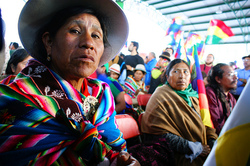
Transantional Institute | July 2012
A ‘Land Sovereignty’ Alternative?
Towards a Peoples’ Counter-Enclosure
Dramatic changes around food, climate, energy, and finance in recent years have pushed questions of land use and land control back onto the centre stage of development discourse, at the very moment when the same conditions are spurring an unprecedented rush for land and water across the globe.
Although it is often overlooked, water also figures heavily in this new cycle of resource-grabbing, both as a driver of land grabbing for industrial agriculture, and as a target itself, as in the case of water-grabbing for hydropower or hydraulic fracturing (aka ‘fracking’), for example. A fusion of the industrial agro-food and energy complexes has made land and water key resources in the global capitalist system again, fuelling in turn a huge renewed process of enclosure known as the ‘global land grab’.
There is a need to come to grips with land issues in a changing global context and to rethink what may be needed to mobilise effectively in such a setting. The main frameworks of advocacy that have been employed by some academics, radical researchers and social movement activists have some particular limitations in the context of global land grabbing. Neither land reform nor land tenure security alone are well-equipped to be frameworks for analysis or action in the current conjuncture. Land reform remains important, but its limitations as a call to action are being exposed by the current cycle of land grabbing. Likewise, land tenure security is important, but alone is not enough, since adverse incorporation of the rural working poor classes into the corporate-controlled global food-feed-fuel regime does not necessarily require moving them off the land.
If, as our analysis suggests, there is a need to transition the people’s demand for land from ‘land reform’ and ‘land tenure security’ to something else, then ‘land sovereignty’ as a framework is worth considering.












